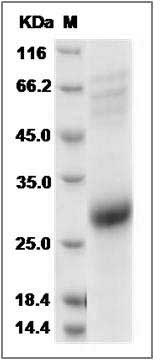-
Product Name
Rat CD70/CD27L/TNFSF7 (His Tag) recombinant protein
- Documents
-
Description
CD70, a member of the tumor necrosis factor superfamily, is restricted to activated T-and B-lymphocytes and mature dendritic cells. Binding of CD70 to its receptor, CD27, is important in priming, effector functions, differentiation and memory formation of T-cells as well as plasma and memory B-cell generation. Tight control of CD70 expression is required to prevent lethal immunodeficiency. By selective transcription, CD70 is largely confined to activated lymphocytes and dendritic cells (DC). As a type II transmembrane receptor, CD70 is normally expressed on a subset of B, T and NK cells, where it plays a costimulatory role in immune cell activation. Immunohistochemical analysis of CD70 expression in multiple carcinoma types. The restricted expression pattern of CD70 in normal tissues and its widespread expression in various malignancies makes it an attractive target for antibody-based therapeutics. Investigations to exploit CD70 as a cancer target have lead to the identification of potential antibody-based clinical candidates.
-
Protein short names
CD27LG; CD70; CD27L; TNFSF7
-
Source/Expression Host
Human Cells
-
Expression Plasmid/cDNA
A DNA sequence encoding the rat CD70 (NP_001100348) (Gln46-Pro195) was expressed, fused with a polyhistidine tag at the N-terminus.
-
Protein Species
Rat
-
Molecular weight
The recombinant rat CD70 comprises 170 amino acids and has a predicted molecular mass of 18.9 kDa. The apparent molecular mass of the protein is approximately 28 kDa in SDS-PAGE under reducing conditions.
-
Purity
> 90 % as determined by SDS-PAGE
-
Validations

Rat CD70 / CD27L / TNFSF7 Protein (His Tag) SDS-PAGE
Related Products / Services
Please note: All products are "FOR RESEARCH USE ONLY AND ARE NOT INTENDED FOR DIAGNOSTIC OR THERAPEUTIC USE"
